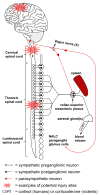B cells and autoantibodies: complex roles in CNS injury
- PMID: 20691635
- PMCID: PMC2933277
- DOI: 10.1016/j.it.2010.06.006
B cells and autoantibodies: complex roles in CNS injury
Abstract
Emerging data indicate that traumatic injury to the brain or spinal cord activates B lymphocytes, culminating in the production of antibodies specific for antigens found within and outside the central nervous system (CNS). Here, we summarize what is known about the effects of CNS injury on B cells. We outline the potential mechanisms for CNS trauma-induced B cell activation and discuss the potential consequences of these injury-induced B cell responses. On the basis of recent data, we hypothesize that a subset of autoimmune B cell responses initiated by CNS injury are pathogenic and that targeted inhibition of B cells could improve recovery in cases of brain and spinal cord injury.
Published by Elsevier Ltd.
Figures


References
-
- Ankeny DP, et al. Spinal cord injury triggers systemic autoimmunity: evidence for chronic B lymphocyte activation and lupus-like autoantibody synthesis. J Neurochem. 2006;99 (4):1073–1087. - PubMed
-
- Popovich PG, Longbrake EE. Can the immune system be harnessed to repair the CNS? Nat Rev Neurosci. 2008;9 (6):481–493. - PubMed
-
- Stefanova I, et al. Self-recognition promotes the foreign antigen sensitivity of naive T lymphocytes. Nature. 2002;420 (6914):429–434. - PubMed
-
- Kil K, et al. T cell responses to myelin basic protein in patients with spinal cord injury and multiple sclerosis. J Neuroimmunol. 1999;98 (2):201–207. - PubMed
MeSH terms
Substances
Grants and funding
LinkOut - more resources
Full Text Sources

